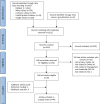How capacity building of district health managers has been designed, delivered and evaluated in sub-Saharan Africa: a scoping review and best fit framework analysis
- PMID: 37532484
- PMCID: PMC10401232
- DOI: 10.1136/bmjopen-2022-071344
How capacity building of district health managers has been designed, delivered and evaluated in sub-Saharan Africa: a scoping review and best fit framework analysis
Abstract
Objectives: We aimed to understand how capacity building programmes (CBPs) of district health managers (DHMs) have been designed, delivered and evaluated in sub-Saharan Africa. We focused on identifying the underlying assumptions behind leadership and management CBPs at the district level.
Design: Scoping review.
Data sources: We searched five electronic databases (MEDLINE, Health Systems Evidence, Wiley Online Library, Cochrane Library and Google Scholar) on 6 April 2021 and 13 October 2022. We also searched for grey literature and used citation tracking.
Eligibility criteria: We included all primary studies (1) reporting leadership or management capacity building of DHMs, (2) in sub-Saharan Africa, (3) written in English or French and (4) published between 1 January 1987 and 13 October 2022.
Data extraction and synthesis: Three independent reviewers extracted data from included articles. We used the best fit framework synthesis approach to identify an a priori framework that guided data coding, analysis and synthesis. We also conducted an inductive analysis of data that could not be coded against the a priori framework.
Results: We identified 2523 papers and ultimately included 44 papers after screening and assessment for eligibility. Key findings included (1) a scarcity of explicit theories underlying CBPs, (2) a diversity of learning approaches with increasing use of the action learning approach, (3) a diversity of content with a focus on management rather than leadership functions and (4) a diversity of evaluation methods with limited use of theory-driven designs to evaluate leadership and management capacity building interventions.
Conclusion: This review highlights the need for explicit and well-articulated programme theories for leadership and management development interventions and the need for strengthening their evaluation using theory-driven designs that fit the complexity of health systems.
Keywords: health equity; health services accessibility; health services administration & management; public health.
© Author(s) (or their employer(s)) 2023. Re-use permitted under CC BY-NC. No commercial re-use. See rights and permissions. Published by BMJ.
Conflict of interest statement
Competing interests: None declared.
Figures




References
-
- Évaluation des progrès réalisés en afrique pour atteindre LES objectifs du millénaire pour le développement. In: Rapport OMD 2015. 2015.
-
- Alliance for Health P, Systems R . Strengthening health systems: the role and promise of policy and systems research. Geneva, 2004.
-
- Egger D, Ollier E. Managing the health millennium development goals - The challenge of health management strengthening: lessons from three countries. Geneva: World Health Organization, 2007.
Publication types
MeSH terms
LinkOut - more resources
Full Text Sources
Miscellaneous
